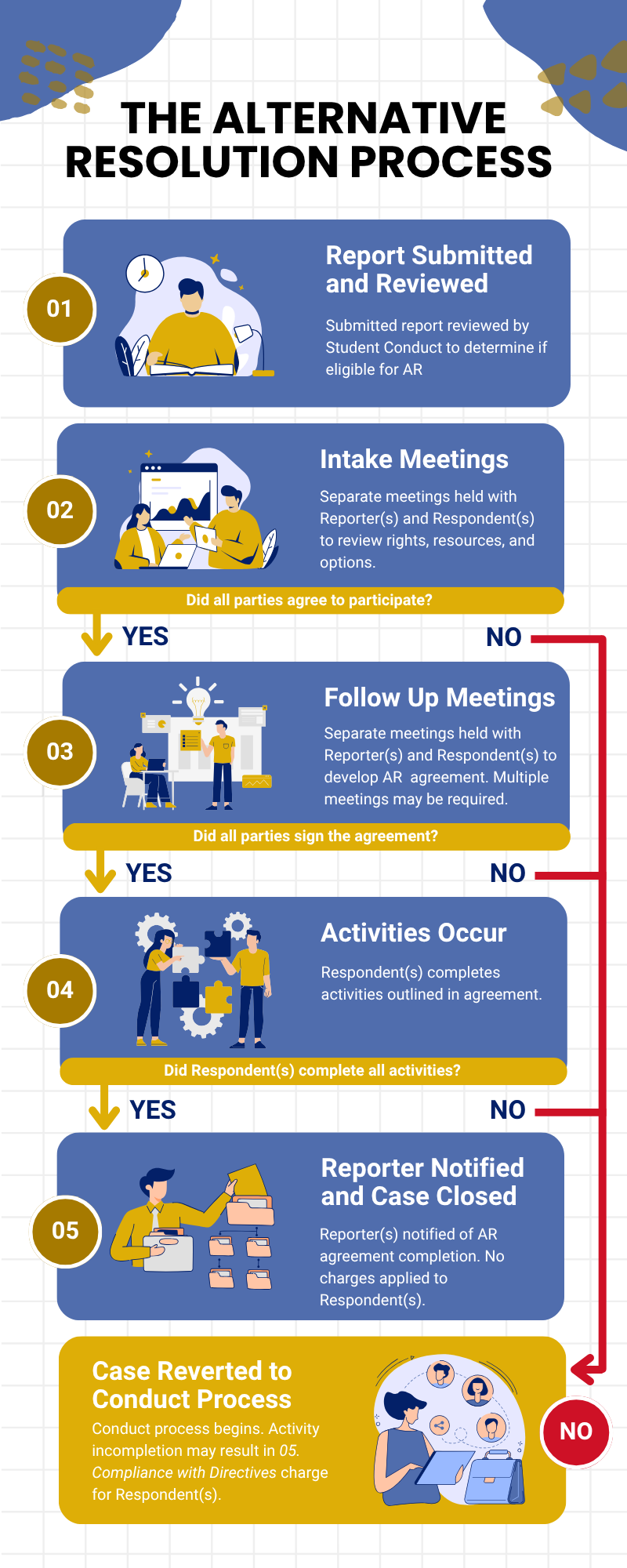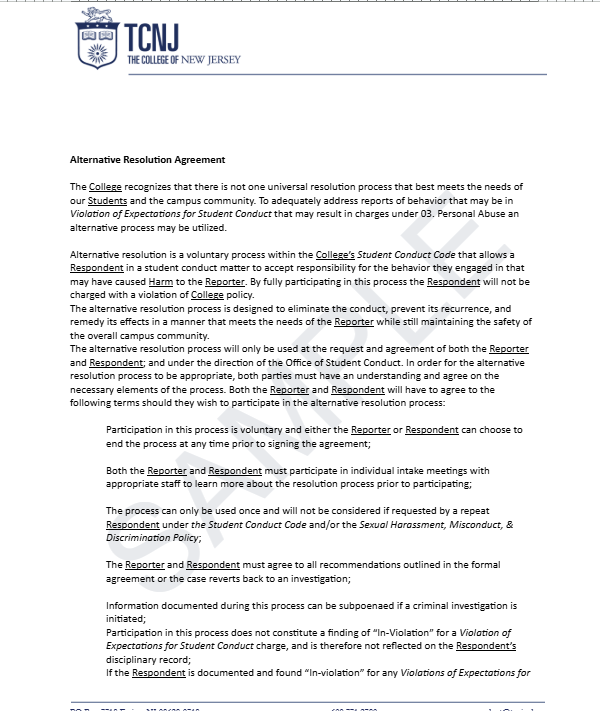The College recognizes that there is not one universal resolution process that best meets the needs of our Students and the campus community. To adequately address reports of behavior that may be in Violation of Expectations for Student Conduct that may result in charges under 03. Personal Abuse an alternative process may be utilized.
Rooted in Restorative Justice practices, alternative resolution is a voluntary process within the College’s Student Conduct Code that allows a Respondent in a student conduct matter to accept responsibility for the behavior they engaged in that may have caused Harm to the Reporter. By fully participating in this process the Respondent will not be charged with a violation of College policy.
Process Overview
The alternative resolution process is designed to eliminate the conduct, prevent its recurrence, and remedy its effects in a manner that meets the needs of the Reporter while still maintaining the safety of the overall campus community. Below is more information about the process:
Requirements for Participation
The alternative resolution process will only be used at the request and agreement of both the Reporter and Respondent; and under the direction of the Office of Student Conduct & Off-Campus Services. In order for the alternative resolution process to be appropriate, both parties must have an understanding and agree on the necessary elements of the process. Both the Reporter and Respondent will have to agree to the following terms should they wish to participate in the alternative resolution process:
- Participation in this process is voluntary and either the Reporter or Respondent can choose to end the process at any time prior to signing the agreement;
- Both the Reporter and Respondent must participate in individual intake meetings with appropriate staff to learn more about the resolution process prior to participating;
- The process can only be used once and will not be considered if requested by a repeat Respondent under the Student Conduct Code and/or the Sexual Harassment, Misconduct, & Discrimination Policy;
- The Reporter and Respondent must agree to all recommendations outlined in the formal agreement or the case reverts back to an investigation;
- Information documented during this process can be subpoenaed if a criminal investigation is initiated;
- Participation in this process does not constitute a finding of “In-Violation” for a Violation of Expectations for Student Conduct charge, and is therefore not reflected on the Respondent’s disciplinary record;
- If the Respondent is documented and found “In-violation” for any Violations of Expectations for Student Conduct this agreement can be used in the sanctioning phase of that process; and
- The Respondent may be charged with 05. Compliance with Directives for failure to meet all requirements outlined in the agreement.
Contents of the Alternative Resolution Agreement
A Restorative process is a philosophical approach to dispute resolution that embraces the reparation of Harm, healing of trauma, reconciliation of interpersonal conflict, and reintegration of people who have been marginalized through participatory learning and improved decision making skills. Rather than focusing on what policies have been violated, restorative processes instead identify who has been Harmed and what actions are necessary moving forward to repair the Harm.
The College recognizes that there is no single way to try and repair harm, and as such, the resolution agreement drafted as part of this process is tailored to be as individual as possible to try and repair in individualized harm that may have been caused/experienced. Therefore, there is no standard contract that is used for each case, rather they are unique to the needs of each individual Reporter.
While the resolution agreement is personalized and specific to each individual Reporter, some examples of possible options that students may utilize in this process include, but are not limited to::
- Restorative Circle – Participation in a discussion by trained facilitators with a Reporter or Harmed Parties that is designed to result in the shared agreement outlining how to correct the Harm caused by the Respondents behavior. The Reporter/Harmed Parties and Respondent (and possible community members) work together to develop an agreement that resolves the issue(s), and can help the Respondent restore their standing in the community and repair relations that were damaged by their actions. During the circle process both Students can have a support person present. A support person differs from an Advisor as this person can have an active role during this process. A support person must be approved by the lead facilitator.
- Impact Statement
- Counseling Sessions
- Alcohol/Drug Education Class(es)
- Check-in Meetings – Respondent has bi-weekly or monthly check-in meetings with the Director of Student Conduct & Off-Campus Services or other assigned staff member of the College
- Implementation of a No Contact Directive with the College – A no contact directive is an official College directive that serves as notice to an individual that they must not have physical contact with or proximity to, or direct verbal, electronic, or written Communication with another individual or group, nor shall they coordinate indirect Communications with the other individual or group through a Third Party
- Participation Restrictions – Respondent is restricted from participating in specific recognized student organizations and/or particular events (e.g. Last Night on the Lake)
- Mentored Action Plan – Respondent developed and completes a mentored action plan with regular meetings with an assigned staff member of the College
- Community Service
Sanctions and Charges
An Alternative Resolution Process does not involve the implementation of punitive sanctions for the Respondent. This is a non-punitive process, which rather than focusing on whether a Policy violation occurred, focuses on identifying the incident that caused the harm and to whom, the needs of the person who was harmed, and how the person who caused harm can repair it. Should a Respondent agree to participate in this process and completes the agreement in good faith, no sanctions will be applied, nor will their participation be reflected on their disciplinary history through the College. However, in the event that the Respondent signs the contract stating that they will participate in all educational items laid out in the agreement and fails to do so, the Respondent may be charged with 5. Compliance with Directives/d.
Alternative Resolution Steps and Timeline
An Alternative Resolution Process can range in the length of time required, but typically it is shorter than a traditional student conduct process with possible 03. Personal Abuse charges. A minimum of two meetings are required for each party, but more may be required to finish crafting an agreement. Agreement outcomes are then completed by specified deadlines.
Step 1: Report Submitted and Reviewed
An Incident Report is submitted and reviewed by Office of Student Conduct & Off-Campus Services. The Incident Report is reviewed by the Office of Student Conduct & Off-Campus Services to determine if the matter is eligible for an alternative resolution process. If the matter is not eligible, it will defer back to a traditional Student Conduct Process.
Step 2: Intake Meetings
Student Conduct staff meets individually with Reporter(s) and Respondent(s). Students will be informed of their rights, resources, and options. If all parties agree, the alternative resolution process will move forward. It not all parties agree, the matter will revert back to a Conduct Investigation or will be closed.
Step 3: Follow-Up Meetings
Student Conduct staff will hold follow up meetings with Reporter(s) and Respondent(s) to develop the agreement. This may require multiple meetings. Essentially, Student Conduct acts as a negotiator between the two parties separately until they are all on board with the process. If all parties reach an agreement, they will sign it. If the parties do not reach an agreement, the matter will revert back to a Conduct Investigation or will be closed.
Step 4: Activities Occur
The Respondent(s) will complete all activities as outlined in the agreement, which may include a summative meeting with Student Conduct staff. If the Respondent(s) does not fulfill all terms of the agreement, the matter will revert back to a Conduct Investigation. The Respondent(s) may additionally be charged with 5. Compliance with Directives/d.
Step 5: Case Closed
The Reporter(s) is notified of the Alternative Resolution Agreement completion and the case is closed. If the Alternative Resolution Process is successfully completed, no charges will be applied to the Respondent nor would their participation in the Alternative Resolution process appear on a Disciplinary Background Check.
Resources
Alternative Resolution Process Flow Chart
Sample Agreement
Other Conduct Resolution Options and Processes


